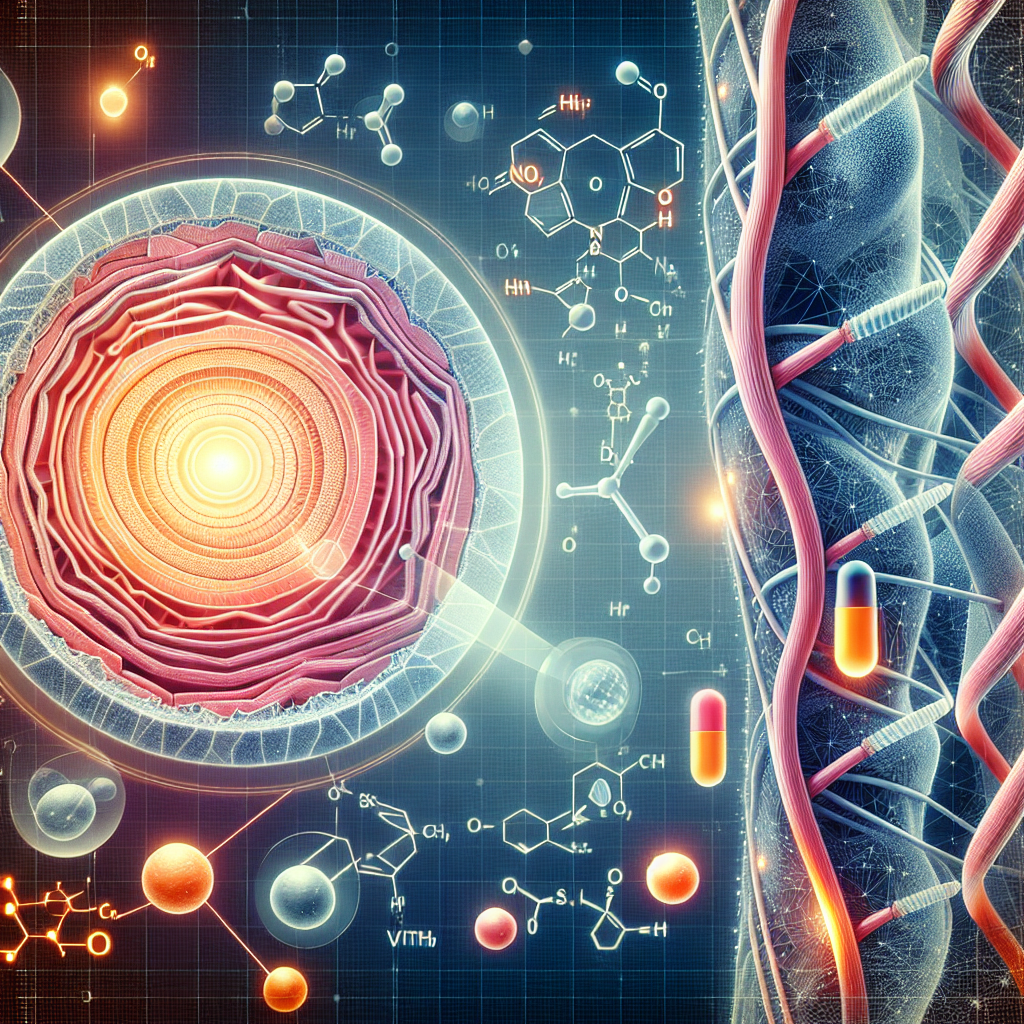The Science Behind Vitamins and Skin Elasticity

Discover the science behind vitamins and skin elasticity! Learn how the right vitamins can enhance your skin’s health and youthfulness. Visit My Vibrant Vitality now to start your journey towards vibrant, elastic skin.
The Role of Vitamins in Maintaining Skin Elasticity: A Scientific Perspective
The science behind vitamins and skin elasticity is a fascinating field of study that has garnered significant attention in recent years. As we age, our skin naturally loses its elasticity, leading to the formation of wrinkles and fine lines. However, research suggests that certain vitamins can play a crucial role in maintaining skin elasticity, thereby slowing down the aging process.
Vitamins are organic compounds that our bodies need in small amounts to function properly. They are essential for various bodily functions, including maintaining skin health. The skin, being the largest organ of the body, is often the first to show signs of vitamin deficiencies. This is where the role of vitamins in maintaining skin elasticity comes into play.
Vitamin A, for instance, is a potent antioxidant that helps to protect the skin from harmful free radicals. Free radicals are unstable molecules that can damage the skin’s cells, leading to premature aging. Vitamin A helps to neutralize these free radicals, thereby preserving the skin’s elasticity. Moreover, it promotes the production of collagen, a protein that gives the skin its firmness and elasticity.
Vitamin C, on the other hand, is crucial for the synthesis of collagen. It aids in the formation of collagen fibers, which are essential for maintaining the skin’s elasticity. Additionally, vitamin C is a powerful antioxidant that helps to protect the skin from damage caused by exposure to ultraviolet (UV) radiation. This protection is vital as UV radiation can break down collagen and elastin, the proteins responsible for the skin’s elasticity and firmness.
Vitamin E is another essential vitamin for skin health. It is a potent antioxidant that helps to protect the skin from damage caused by free radicals and UV radiation. Furthermore, vitamin E helps to maintain the skin’s moisture balance, which is crucial for maintaining its elasticity. When the skin is well-hydrated, it remains plump and elastic, reducing the appearance of wrinkles and fine lines.
Vitamin B3, also known as niacinamide, is another key player in maintaining skin elasticity. It helps to improve the skin’s barrier function, which is crucial for maintaining its moisture balance. Moreover, vitamin B3 has been shown to stimulate the production of collagen and elastin, thereby helping to maintain the skin’s elasticity.
In conclusion, vitamins play a crucial role in maintaining skin elasticity. They help to protect the skin from damage, promote the production of collagen and elastin, and maintain the skin’s moisture balance. However, it’s important to note that while vitamins can help to maintain skin elasticity, they are not a magic bullet for preventing or reversing skin aging. A healthy lifestyle, including a balanced diet, regular exercise, and adequate sleep, is also essential for maintaining skin health. Moreover, it’s always advisable to consult with a healthcare professional before starting any new supplement regimen.
The science behind vitamins and skin elasticity is a rapidly evolving field, and ongoing research continues to shed light on the complex interactions between vitamins and skin health. As we continue to learn more about these interactions, we can better understand how to harness the power of vitamins to maintain our skin’s elasticity and overall health.
Understanding the Science: How Vitamins Contribute to Skin Elasticity

The science behind vitamins and skin elasticity is a fascinating field of study that has garnered significant attention in recent years. As we age, our skin naturally loses its elasticity, leading to the formation of wrinkles and fine lines. However, research has shown that certain vitamins can play a crucial role in maintaining and even improving skin elasticity, thereby slowing down the aging process.
Vitamins are organic compounds that our bodies need in small amounts to function properly. They are essential for various bodily functions, including growth, digestion, and nerve function. Some vitamins also have antioxidant properties, meaning they can protect our cells from damage caused by free radicals, unstable molecules that can harm cellular structures. This protective function is particularly important when it comes to skin health.
One of the key vitamins in this regard is vitamin C. This water-soluble vitamin is well-known for its antioxidant properties. It plays a crucial role in the synthesis of collagen, a protein that gives skin its elasticity. Collagen fibers form a network in the skin that provides structure and firmness. As we age, the production of collagen decreases, leading to a loss of skin elasticity. However, by increasing our intake of vitamin C, we can boost collagen production and help maintain skin elasticity.
Vitamin E is another essential nutrient that contributes to skin elasticity. Like vitamin C, vitamin E has strong antioxidant properties. It helps protect the skin from damage caused by free radicals and environmental factors such as UV radiation. By doing so, it helps maintain the integrity of the collagen network in the skin, thereby preserving skin elasticity.
Vitamin A, also known as retinol, is another key player in skin health. It promotes the production of skin-building compounds, including collagen. It also aids in the repair of skin damage and can help reduce the appearance of wrinkles and fine lines. Moreover, vitamin A has been shown to improve skin elasticity and hydration, making it a vital component of many anti-aging skincare products.
Lastly, vitamin B3, or niacinamide, has been gaining recognition for its role in skin health. This vitamin has been shown to improve the skin’s elasticity, texture, and tone. It works by increasing the production of ceramides, lipids that help maintain the skin’s protective barrier. This not only helps keep the skin hydrated but also protects it from environmental damage, which can contribute to a loss of elasticity over time.
In conclusion, vitamins play a crucial role in maintaining and improving skin elasticity. They do this by promoting the production of skin-building proteins like collagen, protecting the skin from damage, and helping to maintain the skin’s protective barrier. By ensuring a sufficient intake of these vitamins, either through diet or skincare products, we can help preserve our skin’s elasticity and slow down the aging process. However, it’s important to remember that while vitamins are essential for skin health, they are just one piece of the puzzle. A balanced diet, regular exercise, adequate sleep, and proper skincare routine are also vital for maintaining healthy, elastic skin.
Vitamins and Skin Health: The Scientific Connection Explained
The science behind vitamins and skin elasticity is a fascinating field of study that has garnered significant attention in recent years. As we age, our skin naturally loses its elasticity, leading to the formation of wrinkles and fine lines. However, research has shown that certain vitamins can play a crucial role in maintaining and even improving skin elasticity, thereby slowing down the aging process.
Vitamins are essential nutrients that our bodies need to function properly. They play a vital role in various biological processes, including cell growth, immune function, and energy production. In the context of skin health, vitamins are particularly important because they help to maintain the integrity of the skin barrier, protect against environmental damage, and promote skin cell regeneration.
One of the key vitamins in this regard is vitamin C. This water-soluble vitamin is a potent antioxidant that helps to neutralize harmful free radicals in the skin. Free radicals are unstable molecules that can damage cells and contribute to aging and diseases. By neutralizing these molecules, vitamin C helps to protect the skin from oxidative stress, a major cause of skin aging. Moreover, vitamin C is essential for the synthesis of collagen, a protein that gives the skin its elasticity. By promoting collagen production, vitamin C can help to maintain skin elasticity and reduce the appearance of wrinkles.
Another important vitamin for skin elasticity is vitamin E. Like vitamin C, vitamin E is a powerful antioxidant that protects the skin from oxidative stress. But it also has a unique role in skin health. Vitamin E is a fat-soluble vitamin that is stored in the sebaceous glands in the skin. These glands produce an oily substance called sebum, which helps to keep the skin moisturized and elastic. Vitamin E is a key component of sebum, and its presence helps to maintain skin hydration and elasticity.
Vitamin A is another essential nutrient for skin health. It is a fat-soluble vitamin that is involved in cell growth and differentiation. In the skin, vitamin A helps to promote the turnover of skin cells, ensuring that the skin remains smooth and elastic. Moreover, vitamin A has been shown to stimulate the production of collagen and elastin, two proteins that are essential for skin elasticity.
Finally, the B vitamins, particularly biotin and niacin, also play a role in skin health. Biotin is involved in the metabolism of fats, proteins, and carbohydrates, which are all necessary for skin health. Niacin, on the other hand, helps to improve skin elasticity by increasing the production of ceramides, lipids that help to maintain the skin barrier and keep the skin hydrated.
In conclusion, vitamins play a crucial role in maintaining and improving skin elasticity. They do this by protecting the skin from environmental damage, promoting skin cell regeneration, and stimulating the production of proteins that give the skin its elasticity. Therefore, a diet rich in these vitamins, or the use of skincare products containing them, can help to keep the skin healthy and youthful. However, it’s important to remember that while vitamins can support skin health, they cannot replace a balanced diet, regular exercise, and a healthy lifestyle.